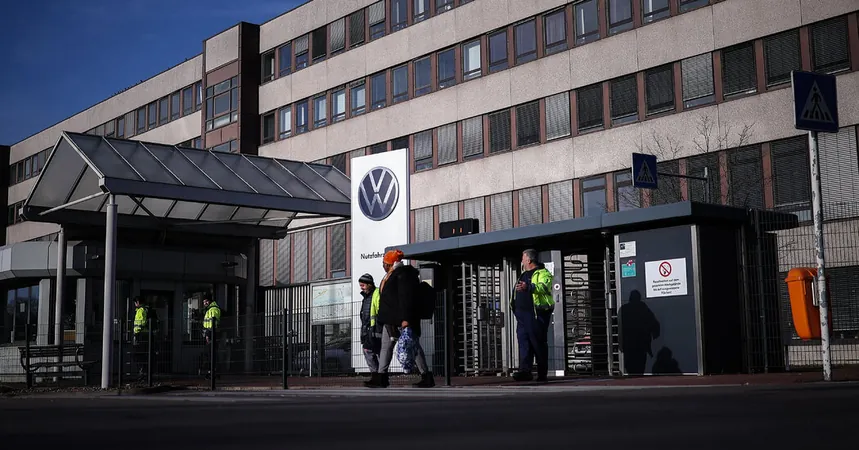
Volkswagen Seals Major Labor Deal, Ensuring Future of German Plants Amid Economic Challenges
2024-12-20
Author: Ken Lee
Volkswagen Secures Future Through Labor Deal
In a significant move for the automotive giant, Volkswagen has successfully negotiated a labor deal with its union, averting potential factory closures in Germany. This resolution comes after an intense three-month standoff that highlighted the pressing issues facing German industry, as demand weakens both domestically and internationally.
The agreement was finalized after over 70 hours of negotiations in Hanover, ensuring that all ten Volkswagen factories in Germany will remain operational and that employees’ jobs are guaranteed until the end of 2030. However, as part of a planned restructuring, the company anticipates job losses of over 35,000 through retirements and attrition over this period.
In an impressive show of compromise, the union IG Metall—representing a significant proportion of Volkswagen’s 120,000 German workers—retracted its demand for a wage increase until 2031. This concession also included cuts to bonuses and a reduction in car production quotas across various plants.
Union Leadership and Economic Context
"We have secured the future of the company and the jobs of our employees," declared Daniela Cavallo, head of Volkswagen's works council, upon announcing the deal. The stakes were high, with the company grappling with a surplus of labor amidst declining orders, a scenario exacerbated by rising competition from Chinese car manufacturers.
Reflecting broader economic struggles in Germany, projections indicate that the nation's economy may contract for a second consecutive year in 2024, with little hope for significant recovery by 2025. The labor dispute threatened to disrupt Volkswagen’s traditionally robust partnership with its workforce, with many workers voicing feelings of betrayal against the backdrop of a time-honored collective bargaining system designed to balance company and employee interests.
Solidarity from the Workforce
In a show of solidarity, approximately 100,000 IG Metall members staged brief walkouts in December. The union had previously threatened to escalate its actions into prolonged strikes beginning in January if no resolution was reached.
CEO's Perspective and Financial Implications
Volkswagen's CEO, Oliver Blume, expressed optimism about the deal, emphasizing it sets a crucial pathway for the company amid mounting cost pressures and evolving market demands. The union’s strategic retreat from a proposed 7% wage increase—to instead create a fund equivalent to a 5% wage increase over the next five years—reflects a mutual desire to stabilize the workforce while addressing financial realities.
The new labor agreement is expected to save Volkswagen over €4 billion (approximately $4.2 billion) annually in the coming years and will see a reduction in production capacity by 734,000 vehicles over the next five years. This change aims to redirect investments toward innovative products essential for regaining competitiveness in the automotive landscape.
Broader Industry Impact
Experts believe this resolution sends a powerful message of reassurance to the workforce and could revitalize confidence across Germany's struggling automotive sector. Beatrix C. Keim, from the Center for Automotive Research, noted the importance of Volkswagen's success not only for its own employees but also for the wider network of suppliers reliant on the automaker's stability.
Political Climate and Future Prospects
This deal comes at a crucial time for Germany, as Chancellor Olaf Scholz faces challenges following a recent loss of confidence in Parliament, leading to upcoming elections that will largely focus on reviving the sluggish economy. Contributing factors including soaring energy costs, an unwieldy bureaucracy, and geopolitical tensions have compounded issues, further threatening exports.
As Volkswagen contends with decreasing market demands in Europe and China—along with spiraling labor and energy costs—the urgency for proactive measures is clear. The company recently reported a drop in profits to €2.86 billion (around $3.1 billion) in the last quarter, the lowest in three years. Adding to the pressure, Porsche, Volkswagen’s top shareholder, has signaled potential write-downs of up to €20 billion on its stake in the automaker, underscoring the importance of this labor deal in stabilizing Volkswagen's future.
Conclusion
Will Volkswagen’s bold steps be enough to weather the economic storm? Only time will tell, but this labor agreement marks a vital first step on a challenging road ahead!


 Brasil (PT)
Brasil (PT)
 Canada (EN)
Canada (EN)
 Chile (ES)
Chile (ES)
 España (ES)
España (ES)
 France (FR)
France (FR)
 Hong Kong (EN)
Hong Kong (EN)
 Italia (IT)
Italia (IT)
 日本 (JA)
日本 (JA)
 Magyarország (HU)
Magyarország (HU)
 Norge (NO)
Norge (NO)
 Polska (PL)
Polska (PL)
 Schweiz (DE)
Schweiz (DE)
 Singapore (EN)
Singapore (EN)
 Sverige (SV)
Sverige (SV)
 Suomi (FI)
Suomi (FI)
 Türkiye (TR)
Türkiye (TR)